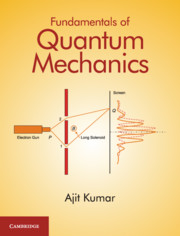Book contents
- Frontmatter
- Dedication
- Contents
- Figures
- Tables
- Preface
- Chapter 1 Introduction
- Chapter 2 The Postulates of Quantum Mechanics
- Chapter 3 One-dimensional Problems
- Chapter 4 Algebraic Formulation of Quantum Mechanics
- Chapter 5 Quantum Mechanics in Three Spatial Dimensions
- Chapter 6 Quantum Mechanical Theory of Orbital Angular Momentum
- Chapter 7 Simple Magnetic Field Effects
- Chapter 8 Quantum Mechanical Theory of the Spin Angular Momentum
- Chapter 9 Addition of Angular Momenta
- Chapter 10 Quantum Mechanics of Many-Particle Systems
- Chapter 11 Symmetry and Conservation Laws
- Chapter 12 Relativistic Generalization
- Appendix A Fundamental Constants
- Appendix B Useful Integrals
- Appendix C Dirac Delta Function
- Appendix D Important Formulae and Equations
- References
- Index
Chapter 11 - Symmetry and Conservation Laws
Published online by Cambridge University Press: 20 October 2018
- Frontmatter
- Dedication
- Contents
- Figures
- Tables
- Preface
- Chapter 1 Introduction
- Chapter 2 The Postulates of Quantum Mechanics
- Chapter 3 One-dimensional Problems
- Chapter 4 Algebraic Formulation of Quantum Mechanics
- Chapter 5 Quantum Mechanics in Three Spatial Dimensions
- Chapter 6 Quantum Mechanical Theory of Orbital Angular Momentum
- Chapter 7 Simple Magnetic Field Effects
- Chapter 8 Quantum Mechanical Theory of the Spin Angular Momentum
- Chapter 9 Addition of Angular Momenta
- Chapter 10 Quantum Mechanics of Many-Particle Systems
- Chapter 11 Symmetry and Conservation Laws
- Chapter 12 Relativistic Generalization
- Appendix A Fundamental Constants
- Appendix B Useful Integrals
- Appendix C Dirac Delta Function
- Appendix D Important Formulae and Equations
- References
- Index
Summary
According to Herman Wey1, by symmetry of an object (or a physical system) we mean the property of the object to appear unchanged after some operation has been done on it. We then say that the object is symmetrical under the given operation. For instance, consider a square. It is indistinguishable after rotations by and about the axis passing through its geometrical center and perpendicular to its plane (Shown by the dot in the figure). This axis is said to be the axis of symmetry of the square. Note that the angle of rotation, for which the square possesses symmetry, takes on only discrete values. Consequently, it has, as we say, a discrete symmetry. On the other hand, a sphere looks unchanged after all rotations (infinitesimal or finite) about its axis of symmetry. Since the angle of rotation can take continuous values, the rotational symmetry of the sphere is a continuous symmetry.
It turns out that, for each continuous symmetry of a physical system, there exists a conserved quantity, i.e., a physical characteristic that remains constant as the system evolves in time according to a given dynamical equation. This result is known as the celebrated Nöther theorem. For example, if we place a system of particles in empty space, far from anything that might affect it, it does not make a difference where exactly we put it. There are no preferred locations in empty space; all locations are equivalent. As a consequence, there is a symmetry for a system of particles with respect to translations in empty space. This translational symmetry leads to the law of conservation of the total linear momentum of the system. Similarly, there exists a symmetry for a system of particles in empty space with respect to rotations of the system as a whole because there are no preferred directions in empty space. This rotational symmetry leads to conservation of the total angular momentum of the system. Another important symmetry is the symmetry with respect to shift in time. It turns out that it does not matter when we perform an experiment on an isolated system. The results will be the same. This symmetry with respect to shift in the origin of time gives rise to the law of conservation of energy.
- Type
- Chapter
- Information
- Fundamentals of Quantum Mechanics , pp. 347 - 371Publisher: Cambridge University PressPrint publication year: 2018



